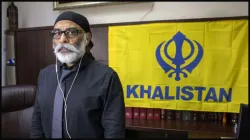Pannun case: Indian national accused in murder plot can be extradited to US, rules Czech court
A final decision on the extradition of Nikhil Gupta lies in the hands of Czech Justice Minister Pavel Blazek once the ruling is delivered to all parties in the case. Gupta had argued his identity was mistaken and that he was not the man the US was looking for, according to Czech media.

Pannun case: An appeal court in the Czech Republic has ruled that Prague can extradite Indian national Nikhil Gupta, accused of a foiled murder plot of designated Khalistani terrorist Gurpatwant Singh Pannun, to the United States, said the Justice Ministry on Friday. A final decision on the extradition of 52-year-old Gupta now lies with Justice Minister Pavel Blazek once the ruling is delivered to all parties in the case, a ministry spokesperson told Reuters.
Czech news website www.seznamzpravy.cz, which first reported on the appeals decision, said Gupta had argued his identity was mistaken and that he was not the man the United States was looking for. He reportedly described the case as political.
"The time frame for the minister's decision cannot be assumed at this point," the Justice Ministry spokesman said, adding that Gupta could be expected to take all steps possible to try to prevent extradition. The minister has three months to turn to the Supreme Court in case he has doubts about the lower court's decisions, added the spokesperson.
The 52-year-old Gupta was charged by federal prosecutors after he was indicted in November last year on charges of working with an Indian government employee in a foiled plot to kill Pannun, who holds dual US and Canadian citizenships, on American soil. Gupta was arrested in Prague, the Czech Republic on June 30, 2023, and the US government is seeking his extradition to America.
US rejects defence materials requested by Gupta
The development comes after a US judge, earlier in January, denied Gupta's request for defence materials pertaining to his indictment in the foiled assassination attempt. This came after federal prosecutors in the US objected to sending proof of charges against Gupta till he made an appearance in a New York court.
United States District Judge Victor Marrero, in an order on January 11, denied a motion filed by Gupta’s attorney seeking discovery material in the case. Marrero said that the Court is persuaded by the government’s argument that Gupta has no right to discovery at this time, citing Federal Rule of Criminal Procedure 16.1, which says that no later than 14 days after the arraignment, “the attorney for the government and the defendant’s attorney must confer and try to agree on a timetable and procedures for pretrial disclosure under Rule 16”.
The district judge further said Gupta has failed to identify any authority suggesting that a defendant has a right to discovery before arraignment. “Gupta has not yet been arraigned in this case, and the government is currently seeking Gupta’s extradition from the Czech Republic to the United States,” he said.
Gupta’s attorney in New York Jeff Chabrowe filed a ‘Motion to Compel Production of Discovery’ on January 4 in the US District Court of Southern District of New York seeking to direct federal prosecutors to provide “the defence materials relevant to its ability to defend the instant charges".
The US government sought for denial of Gupta's motion, saying that “the government is prepared to produce discovery promptly upon the defendant’s appearance in this District and arraignment on this case. Before then, however, the defendant is not entitled to discovery, and he identifies no good reason for the Court to order it".
Nikhil Gupta's defence
Gupta’s counsel in New York Jeff Chabrowe has said in his motion that the attorney representing Gupta in Prague in his extradition proceedings states that “no evidence or documentation of any sort has been given to him other than the US indictment itself". He said Gupta has been interviewed in Prague “by groups of senior US agents on several occasions and continues to be interviewed".
"The defence counsel present in Prague has no evidence or other case materials, other than the bare indictment. Most critically, the defendant continues (to be) interrogated by US officials, after the indictment, where his uninformed counsel has no ability to secure his rights. Accordingly, this Court should order the government to comply with the defence discovery request here,” the motion filed by Chabrowe said.
Gupta's motion also said a municipal court in Prague has initially recommended extradition, "but several layers of judicial review remain before any final extradition order issues". The counsel claimed that US Attorney for the Southern District refuses to begin providing discovery for Gupta.
Meanwhile, the government has rejected Gupta’s assertion that he has been subjected to repeated interrogations by US officials without the presence of the counsel. "In fact, he has met only twice with US law enforcement authorities, the second time in the presence of counsel, and on both occasions, he was advised of his rights, In the first meeting, immediately after his arrest, the defendant waived his rights verbally and spoke with law enforcement agents," said the government's motion.
(with inputs from Reuters, PTI)
ALSO READ | Pannun case: US judge denies request for defence materials by Indian national Nikhil Gupta